Scientific American's Editor in Chief has been booted for her caustic, insulting opinions on the election and for turning a great magazine into a shill for wokeness. This could be the first phase in draining the woke swamp.
Scientific American Ignored Years of Editor
Laura Helmuth’s Appalling Conduct,
Then Scalped Her After I Circulated Her Own Tweets
Support for Helmuth’s hatred and bigotry further exposes science writers’ political bias, meager reporting skills, and distaste for the American public.
Little did I realize that a post I threw up on X would cause Scientific American to shove editor Laura Helmut out the door for hateful post-election comments, action now ricocheting across social media and multiple news outlets. “I've decided to leave Scientific American after an exciting 4.5 years as editor in chief,” Helmuth posted on Bluesky, the social media club for liberals. “I'm going to take some time to think about what comes next (and go birdwatching).”
Pretty much every news account misreports the events that led to Helmuth’s departure, alleging Helmuth’s scalping for appalling behavior—she called members of Gen X “f***ing fascists”—is a political win for “conservatives” or “Trump supporters.” These stories at the New York Times, Guardian, and NPR serve as the latest examples of how lost and divorced from reality too many journalists remain from the American public and anything that approximates actual journalism.
For God’s sake, Helmuth castigated the country—“f*** them to the moon and back”—for going to the polls and voting, but for someone she doesn’t like: Trump.
Helmuth’s demise was a long time coming. Here’s what really happened.
Every week or so I check in on the inmates who have fled X to lock themselves inside the padded ideological cell called Bluesky. I’m not sure why I peek in on the Bluesky carnival, but I’m sure it’s the same sickness that causes me to delve too deeply into people’s personal lives at dinner parties, rubberneck at freeway accidents, and spend numerous hours digging through documents to find some tiny nugget exposing medical malfeasance.
I’m not apologizing. Investigative journalism attracts people with this weirdness.
Tripping across Laura Helmuth’s Bluesky account, I found her in a bigoted political rant, one of many that I’ve caught her in over the years. Instead of ignoring her tirade, for some reason I screenshotted several of her more hateful posts, and threw them on X. I then passed my post along to several reporters who also find her conduct dogmatic and distasteful.
As you can see, my post got a bit of play with over 400K views.
A journalist friend sent me a post by Kevin Bass the next day. Bass had copied the Helmuth tweets I had posted and then pasted them into his own post on X. This got almost 2 million views.
That same day, I noticed that former Scientific American columnist Michael Shermer had also copied the Helmuth Bluesky tweets and was sending them around to his followers, garnering another 400K views. So within 24 hours, around 3 million people had seen Helmuth’s odious tweets that I had dug up on Bluesky.
I don’t know how Helmuth’s tweets caught the attention of executives at Scientific American. However, I guess that several people at the magazine saw Shermer’s post, as he wrote for Scientific American for almost two decades, until he was forced out over the magazine’s hard tilt to the political left under Helmuth.
Regardless, a reporter later texted me that Helmuth had posted an apology and that Scientific American should fire her but they probably wouldn’t do anything. I grabbed Helmuth’s apology and then posted it also on X.
Again, Helmuth has a long history of prejudice and partisanship, but I figured that would be the end of it. But while flying back from a journalism meeting on Thursday night, I got a call that Helmuth had resigned her position at Scientific American. Kimberly Lau, president of Scientific American, confirmed Helmuth's resignation in an email to NPR:
Laura Helmuth has decided to move on from her position as editor in chief. We thank Laura for her four years leading Scientific American, during which time the magazine won major science communication awards and established a reimagined digital newsroom. We wish her well in the future.
Helmuth’s ousting is shocking only because her hatred toward Republican voters—Hello! That’s around half the country—and people who don’t share her personal political views on science have long been known. Former Scientific American columnist Michael Shermer detailed back in 2022 how Helmuth was destroying the magazine’s focus on science in favor of politics. One example he pointed to was a ridiculous article that argued math is racist and sexist: “Modern Mathematics Confronts it’s White Patriarchal Past.”
I actually laughed out loud at one passage in Helmuth’s apology: “I respect and value people across the political spectrum.”
This is a total lie. Several scientists and research physicians have caught Helmuth in ideological bluster during her time running Scientific American, and I’ve written numerous times about Helmuth’s naked politics. For example, I noted in an investigation for The BMJ that Helmuth harangued a senior health official for going on CNN and stating that the pandemic could have started in a lab.
In Helmuth world, that was a “conspiracy theory”:
The growing tendency to treat the lab leak scenario as worthy of serious investigation has put some reporters on the defensive. After Robert Redfield, former director of the Centers for Disease Control and Prevention, appeared on CNN in March, Scientific American’s editor in chief, Laura Helmuth, tweeted, “On CNN, former CDC director Robert Redfield shared the conspiracy theory that the virus came from the Wuhan lab.” The following day, Scientific American ran an essay calling the lab leak theory “evidence free.” And a week later a Nature reporter, Amy Maxmen, labelled the idea that the virus could have leaked from a lab as “conjecture.”
Helmuth did not respond to questions from The BMJ.
Shortly after she began running the magazine, Helmuth published a silly, baffling piece by several unknown academics chastising the movie Star Wars and the TV series Star Trek claiming, “Studies suggest that the presence of Star Wars and Star Trek memorabilia (such as posters) in computer science classrooms can reinforce masculinist stereotypes about computer science—contributing to women’s sense that they don’t belong in that field.”
I have zero clues to explain why Helmuth published this tomfoolery, nor what is has to do with science. I only ran across the piece because Financial Times columnist Jemima Kelly poked fun at it for being “next level” word salad.
Helmuth published a ludicrous hit piece on E.O. Wilson shortly after in late 2021. “Scientific American has hit rock bottom with this new op-ed,” wrote Chicago University emeritus professor of ecology and evolution Jerry Coyne, “that is nothing more than a hit piece on Ed Wilson, basically calling him a racist.”
Complaints about articles Helmuth published are numerous, but here’s another example from this year by clinical epidemiologist Thomas Jefferson and Oxford professor Carl Heneghan:
When we were in medical school, Scientific American was seen as a reliable source of colourful summaries to use to bone up for exams. It is the oldest magazine in America dealing with science. In print since 1845, it was known for articles by world-leading scientists. But not anymore - It’s “Essays Are Rife With Fraud and Citation Sorcery,” reports Paul Thacker.
A few months after the Jefferson and Heneghan complaint, reporter Jennifer Block wrote an investigation in The BMJ that caught Helmuth publishing unscientific views and tweets on transgender care for children:
The magazine’s editor in chief, Laura Helmuth, has promoted these pieces on Twitter/X with declarations like, “The research is clear, and all the relevant medical organisations agree”; policies that restrict treatments are “dangerous, cruel, bigoted, and contrary to all the best scientific and medical evidence.” She’s also disparaged inquiries on the subject. In a February 2023 tweet, Helmuth included gender affirming care among a list of “things we don’t need to be both-sidesing, be ‘objective,’ or be ‘just asking questions!’ about.” Neither Helmuth nor the magazine’s publisher, Nature Springer, responded to a detailed email referencing the articles and more than 15 tweets.
After reading The BMJ piece, I dug around and found one of these Helmuth tweets where she compared concerns with placing children on puberty blockers to unfounded fears over comic books and rap music.
Does this seem normal? However, the BMJ spotlight did nothing to slow Helmuth from spitting out nonsense.
In the last year, both NIH’s Francis Collins and Tony Fauci have testified under oath that there was never any evidence for the government’s six feet social distancing policy. Fauci testified that the six feet rule was not based on science and “it sort of just appeared”, while Collins testified that he was not aware of any evidence supporting social distancing.
Helmuth ignored this and started another political rant in Scientific American and on social media to promote six feet social distancing, not because she had any science to refute Collins’ and Fauci’s sworn testimonies, but because political rants define Laura Helmuth.
Helmuth’s tenure at Scientific American coincided with a steep fall in media trust, now at an historic low. Media is now the least-trusted institution surveyed by Gallup, with more Americans saying they have a great deal or fair amount of trust in Congress, the Supreme Court, local and state governments, and the executive branch than in journalism.
Dismal trust in journalism and Helmuth’s public flogging for bigoted comments should have set science writers back on their heels, causing them to pause, scratch their heads, and reconsider how they conduct themselves in public. But no.
Science writers have little concern for the public, because they see their job as promoting The Science™, the institutions that fund research, and academic scientists with political views that align with their own—meaning the Democratic Party.
Helmuth tweets on Bluesky have long served as a political water cooler for members of the scicomm community and when she announced that she was leaving Scientific American, several prominent voices in the science writers rushed to praise Helmuth, not condemn her for awful behavior and her grim tenure as editor-in-chief.
There is more on this story including a list of science writers who idolize Helmuth, thereby revealing that the swamp is very large and there remains an enormous amount of sludge yet to be dealt with.
It’s important for science writers that no lessons be learned.
===============================================================================================
Could this be another phase beginning?
Cultural Tide Turning? AOC RemovesPronouns From Her Bio
|


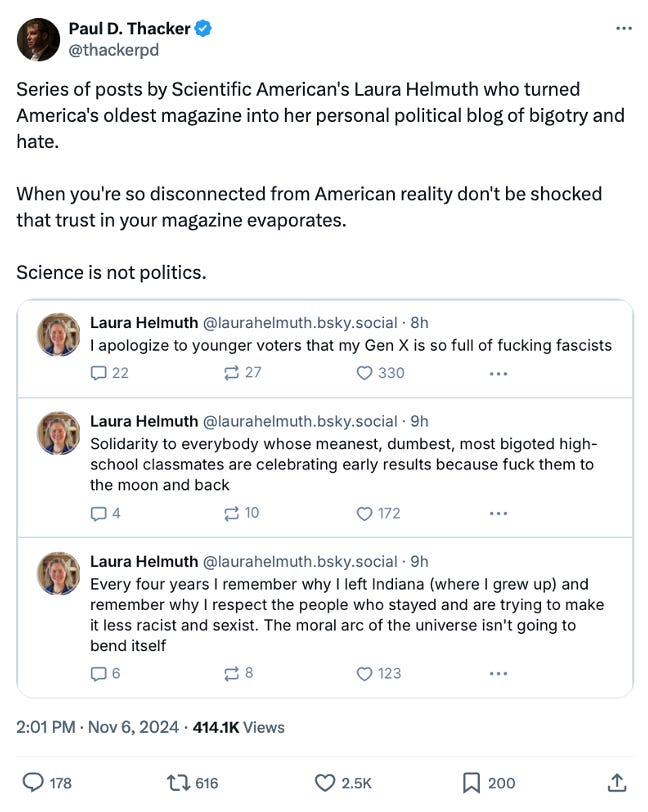
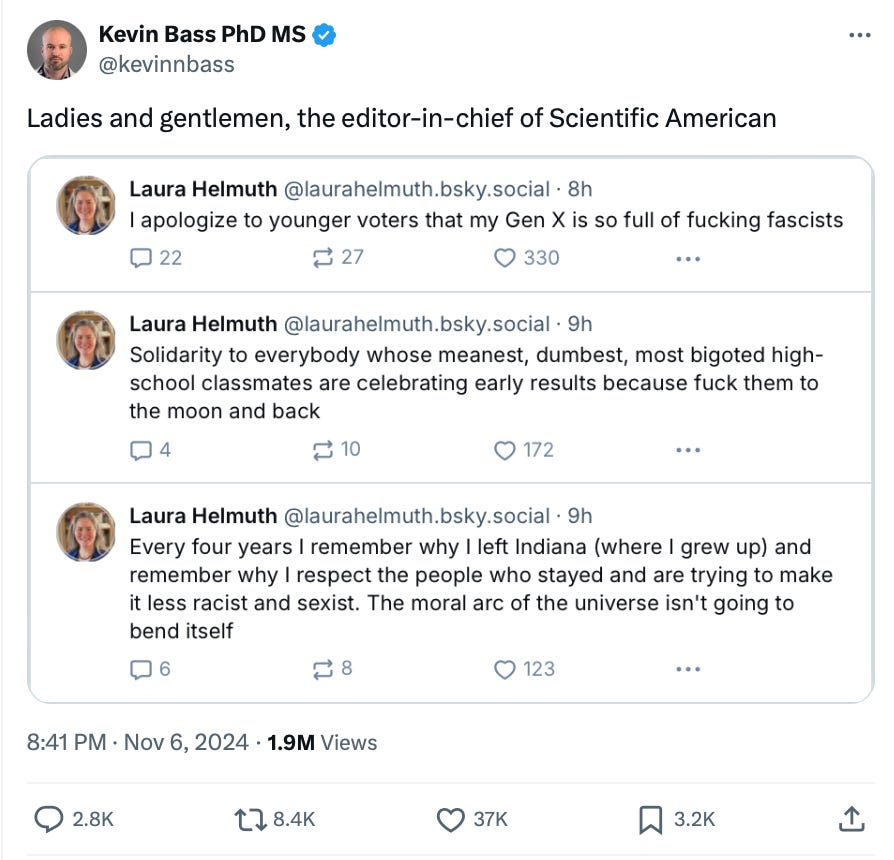
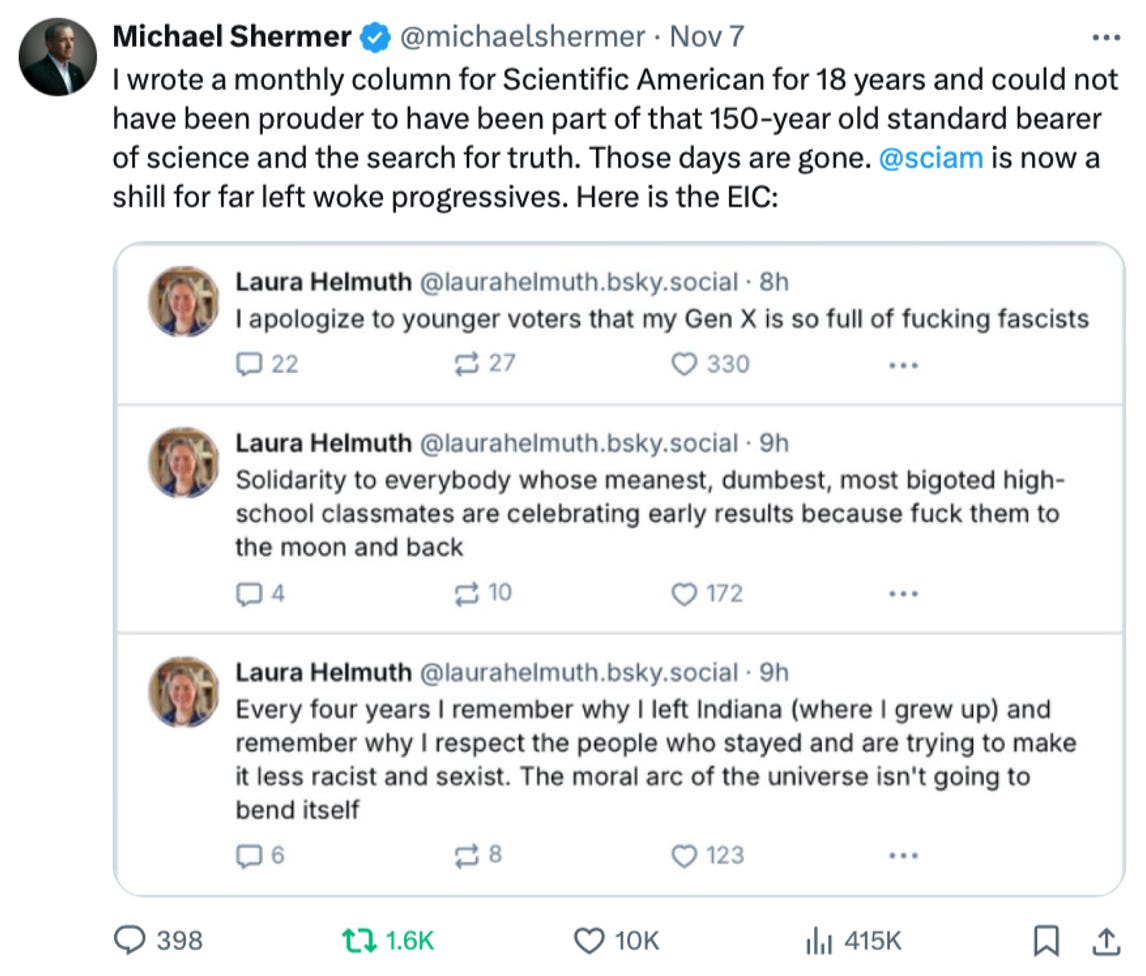
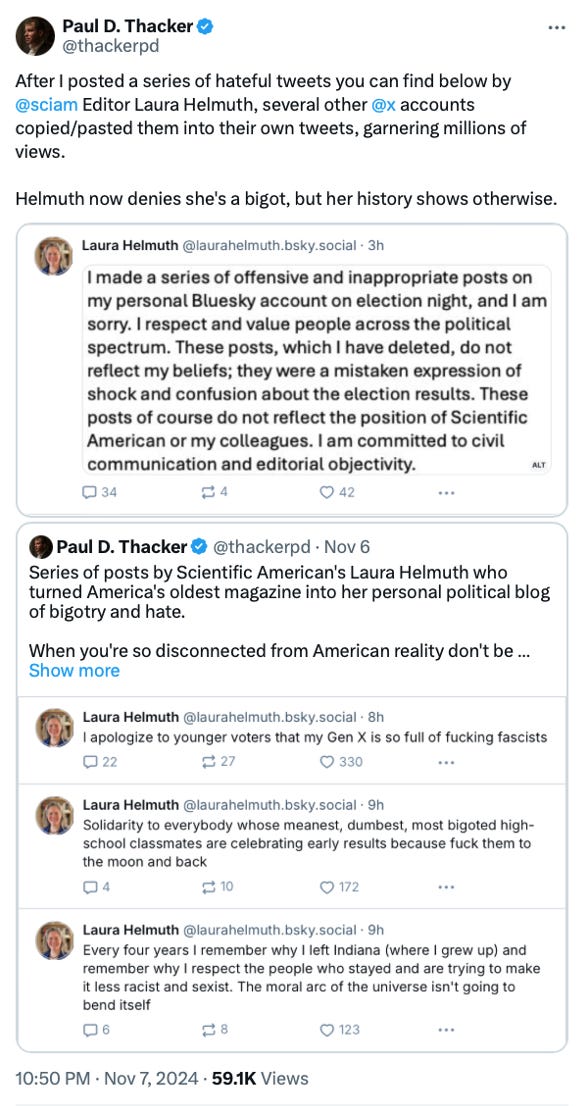


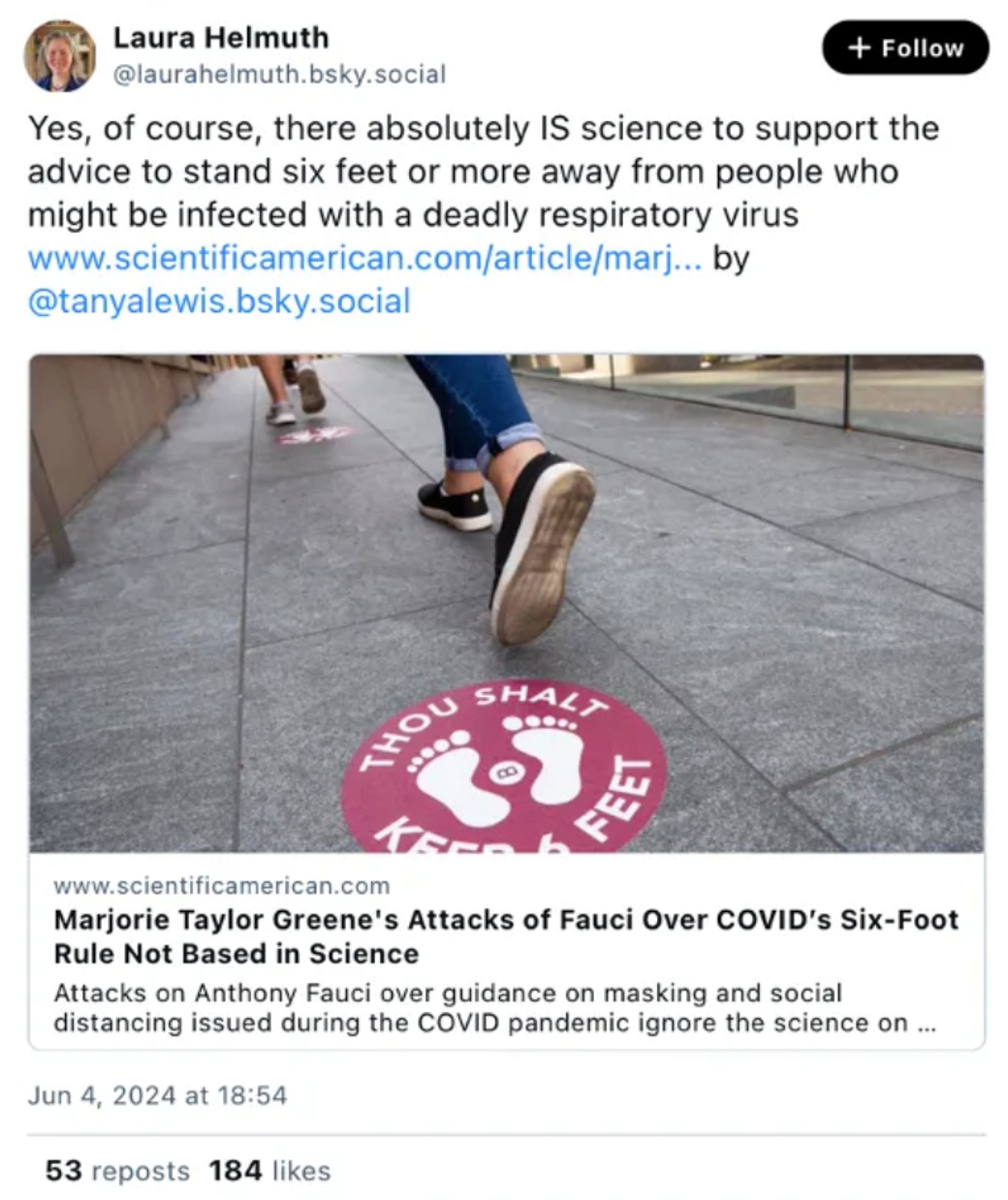
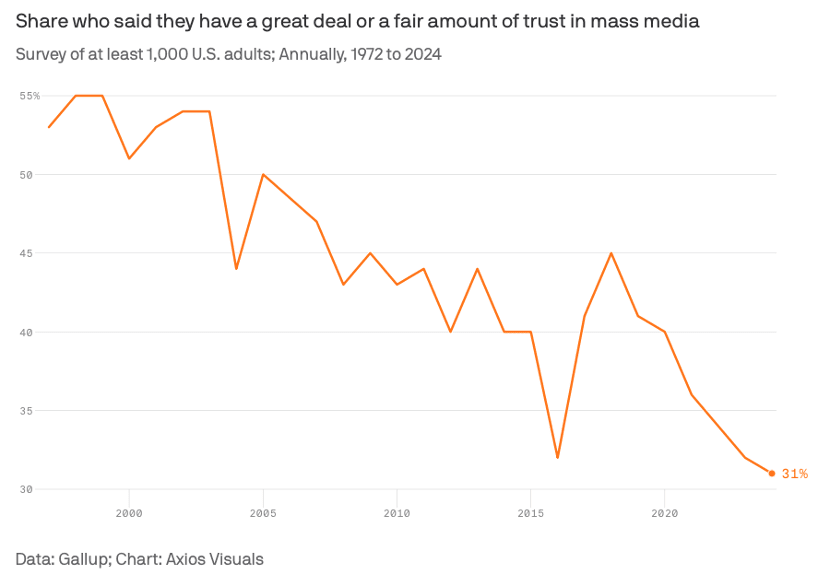

No comments:
Post a Comment